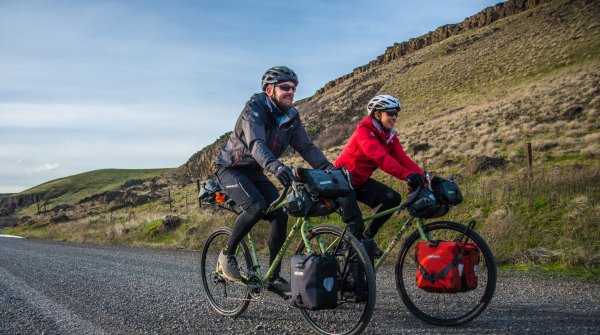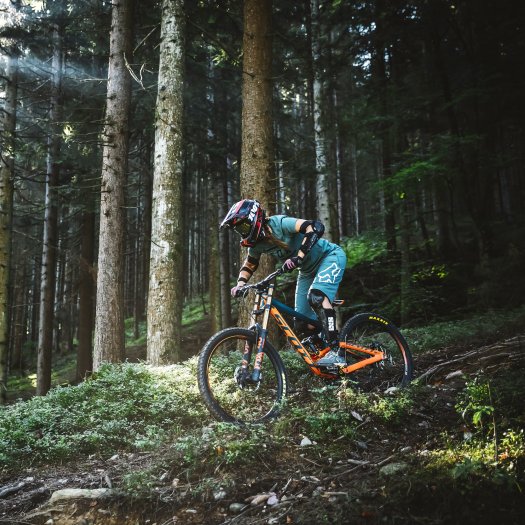High fuel prices, increasingly bikeable infrastructure, and people's drive for exercise and nature mean one thing: The popularity of bicycling is far from over!
According to European Cycling Federation (ECF), the number of bicycles sold will increase by about a third to 30 million by 2030. The share of e-bikes in the sales figures is expected to continue to rise. A clear sign that the bicycle is and will remain a trend.
In Germany alone, more than two million e-bikes were sold for the first time in 2021 - despite the industry's supply chain problems. Demand in Europe is growing steadily, but the largest market for e-bikes will continue to be East Asia in 2022.
If the total value of the e-bike market was still around 24 billion euros in 2021, it will grow to around 48.5 billion euros by 2027 with an annual growth rate of more than twelve percent, according to market researchers from "Mordor Intelligence."
The development in inner-city traffic is moving further and further away from the car. The bicycle infrastructure, on the other hand, is growing steadily, the electric bike trends make it possible to master even hilly routes in a relaxed manner and without sweaty efforts.
In Germany, e-bikes accounted for 53 percent of all bicycle sales in 2024, according to the Zweirad-Industrie-Verband (ZIV). In the mountain bike segment alone, 820,000 e-bikes were sold in Germany, more than 15 times as many E-MTBs as "conventional" mountain bikes (54.000) sold.
Also popular: SUV e-bikes - leaning on the car category with partly dubious reputation. For bikes, SUV means: Everyday mountain bikes with luggage rack, lighting, stand and partly even low entry.
This brings stress-free everyday cycling and at the same time fun, if's times on a bike tour. But the biggest advantage of SUV e-bikes are the powerful batteries and powerful motors for a huge range off-road or on long tours.
Manufacturers like Winora and Flyer serve the target group with their new models "Yakun" and "Goroc 2".
Switch from car to bike - and everything is good. The world could be that simple. In terms of sustainability, however, it is not. Because worldwide bicycle production also leaves its mark, which cannot be neglected from an ecological point of view. Long transport routes, energy-intensive production, problematic raw materials - all these are also negative side effects of the bicycle boom.
At the same time, however, this boom is giving rise to new cycling trends that not only improve comfort, but also aim to make the industry more sustainable. At the end of 2021, 22 companies in the industry launched a charter for sustainable action. The e-bike producer Riese & Müller, one of the signatories of the charter, won the German Sustainability Award in the Twi-Wheelers corporate category in November 2024. The tire manufacturer Schwalbe is developing a recycling system for old tires in a pilot project. Instead of burning old tires, their raw materials should benefit the circular economy.
In addition, the use of recycled aluminium in particular is an innovation. A new bicycle frame can be produced from around 400 old beverage cans, using 95 percent less energy than new production. Equally forward-looking: bio-carbon compounds, which reduce the carbon footprint of frame production by up to 64 percent. The circular economy is also becoming increasingly important in bicycle construction. With the "turn three into one" concept, old bikes are donated and recycled. In addicion, more and more components are being produced that are fully recyclable at the end of their service life – supported by new standards that strengthen competitiveness and promote sustainability in the bike industry.
The most exciting cycling trends currently include not only new materials, but above all technological innovations in the areas of drive, connectivity and safety. The focus is on particularly powerful and compact motors such as the new DJI Avinox Drive System with 105 Nm torque and up to 1000 W of power at a weight of just 2.52 kg. ZF also impresses with the CentriX: a 2.5 kg drive that nevertheless delivers 90 Nm of torque.
In addition to the technology under the hood, the bike is also getting smarter: Bosch is introducing new AO-supported features such as "Range Control", which analytes your riding behavior and calculates the range more precisely, or an "Eco+ Mode" for energy-saving riding. Navigation on the display will also be much more intuitive.
And there are also improvements in terms of safety. Networked sensors detect dangerous situations and can automatically call for help in an emergency. GPS trackers with an app connection also ensure better theft protection – including live tracking and a cloud connection for access by the police.

In 2020 and 2021, it was often harder than the toughest trials to get a new bike at all. Supply bottlenecks due to the corona virus, shortages of raw materials and rising transport prices all met with huge demand at the same time.
In the meantime, many bike brands have reacted and are increasingly moving the production of frames or components from Asia to Europe again. According to "Pressedienst-Fahrrad", production capacities have recently been increased in Portugal, Hungary and Poland. Brands such as Abus, Ortlieb, Brose or Puky rely on Germany as a production location.
As the boom continues, the bike industry is increasingly focusing on technical innovations that make e-bikes even smarter, safer and more comfortable – a clear indicator of current cycling trends. Particularly noteworthy is the new Bosch ABS Pro, which will be used in selected models in 2025. It ensures greater safety thanks to more precise braking, intelligently recognizes riding situations and also provides support during sporty riding.
A lot is also happening when it comes to charging: new public charging stations allow you to charge your bike without your own charger – ideal for on the go. Work is also underway on wireless charging systems that further increase convenience. With the "Range Control" function, it is even possible to specify in advance how full the battery should be at the destination, which is perfekt for efficient energy management.
Last but not least, sustainability is becoming the standard: Since February 2024, all batteres have received a digital product passport with information on their carbon footprint and service life. This will further increase transparency throughout the bike industry.
For a long time, a fat company car was both a status symbol and a privilege. Since there is bicycle leasing, this has changed fundamentally. Because bicycles develop more and more to status symbols and because more and more employers reserve the topic "company car" no longer only the executive floor. As a result, more than 300,000 leased bikes were already on German roads and bike paths in 2020. With a strong upward trend.
Attractive thereby: the leasing rate is paid from the gross salary, so before deduction of taxes and duties. In return, 0.25 percent of the sales price must be taxed each month as a non-cash benefit. This results in attractive monthly installments, which are usually calculated over a three-year period of use. After that, the wheel can be returned or taken over at a residual value price.
Almost all bicycle dealers or Internet mail order companies now work together with large leasing providers. The principle is simple: choose the bike you want, get a leasing offer, sign, ride off. There are also exciting cycling trends in the bike sharing sector that are changing the bike industry for the long term. More and more cities are opting for flexible sharing models that allow users to stay mobile without having to own a bike. The advantages are obvious: no high purchase costs, full cost control, and maintenance and insurance are often already included.
Trends in the bicycle industry
It’s difficult to say what the future holds for biking. A lot of changes are happening constantly due to new technologies and trends. The next several years are crucial for the bike industry, so staying up-to-date on the latest inventions is essential for those who love this type of vehicle.

 Urban CultureOvercoming and triumph: Freeride Anne's fast-paced ride
Urban CultureOvercoming and triumph: Freeride Anne's fast-paced ride
- Awards
- Mountain sports
- Bike
- Fitness
- Health
- ISPO Munich
- Running
- Brands
- Sustainability
- Olympia
- OutDoor
- Promotion
- Sports Business
- Textrends
- Triathlon
- Water sports
- Winter sports
- eSports
- SportsTech
- OutDoor by ISPO
- Heroes
- Transformation
- Sport Fashion
- Urban Culture
- Challenges of a CEO
- Trade fairs
- Sports
- Find the Balance
- Product reviews
- Newsletter Exclusive Area
- Magazine






